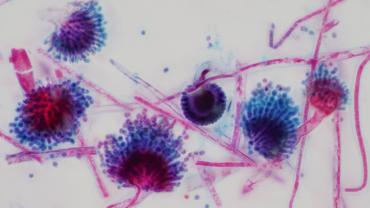
Exposure to toxins such as heavy metals, pesticides, or mycotoxins may occur through ingestion or inhalation of contaminated food, soil, or drinking water. The incidence of toxicity due to indoor mold exposure remains low for most healthy individuals, and only toxin-forming molds are capable of harming human bodies. However, sensitivities can occur even in healthy individuals and mold toxicities such as invasive aspergillosis are growing in prevalence in the U.S., mostly due to the increased occurrence of immunosuppressive states.
The immune response to certain molds can be complex; both innate and adaptive immunities may be involved in the response to mold toxicities. A localized or systemic inflammatory response may also occur. Certain nutrients and phytochemicals have been shown to support immune health, antioxidative status, and a normal response to inflammation. For instance, a breadth of evidence suggests that a Mediterranean-type diet may support the body’s response to oxidative stress and inflammation.
In addition, clinoptilolite is a type of zeolite mineral that is highly porous and has been shown in studies to help bind and neutralize mycotoxins and other clinically relevant substances. It is chemically inert and its molecular size prevents its passage into the bloodstream. Evidence suggests clinoptilolite may also help support intestinal barrier integrity and help promote healthy liver function, antioxidative status, and immune and cellular health. In a laboratory study, clinoptilolite was shown to help promote brush border health and help support the body’s response to toxin-induced epithelial changes.
Probiotics such as Saccharomyces boulardii (S. boulardii) may help support the inflammatory response, microbiome diversity, and gut health in the presence of certain mycotoxins. In recent studies, S. boulardii has been shown to support gastrointestinal (GI) function in the presence of bacterial diarrhea, antibiotic-associated diarrhea, gut dysbiosis, and certain GI disorders. Its cell walls contain beta-glucans, chitin, and mannoproteins that aid in the fermentation process and production of short-chain fatty acids, such as butyrate, to help support the gut microbiome, the gut-brain axis, and various other aspects of health.
Certain nutraceuticals and lifestyle changes may help support the body’s normal inflammatory response and homeostasis in the presence of mycotoxins. Probiotics can be found in sauerkraut, kefir, kimchi, grass-fed yogurt, tempeh, and other naturally fermented foods. Furthermore, minimizing common allergens and moisture levels in living spaces, particularly in bathrooms and damp rooms which are a common area for mold growth, may help prevent mycotoxin exposure. However, more evidence is needed before clinical conclusions can be made.
By Dr. C. Ambrose, ND, MAT